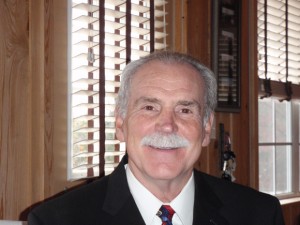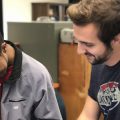 Paul Dongieux (BSChE 73) and Bobby Berry (BSChE 73) shared a remarkable friendship, which began after they met as eighth-graders at Chastain Junior High School in Jackson. The two played football there, at Murrah High School and at the University of Mississippi.
Paul Dongieux (BSChE 73) and Bobby Berry (BSChE 73) shared a remarkable friendship, which began after they met as eighth-graders at Chastain Junior High School in Jackson. The two played football there, at Murrah High School and at the University of Mississippi.
“My friendship with Bobby goes much deeper than just friendship; we were literally joined at the hip during the five years we studied chemical engineering,” said Dongieux, president of Kadant GranTek Inc. “Bobby was one of the most gifted athletes I ever met and was an excellent student.”
The two roommates took classes together the entire time they were in the engineering school. They were separated only after Berry injured his knee and had to transfer his football scholarship to baseball. Berry played for the Rebels in the College World Series in 1972. Dongieux played football until the 1971 season, when Ole Miss made it to the 1972 Peach Bowl.
“[Berry] would travel in the spring with baseball, and I would travel in the fall with football,” Dongieux said. “We had each other’s back and saw each other practically every day of our college careers. Getting through chemical engineering school while playing college athletics is very challenging, and without his help, I never would have made it.”
Berry and his wife, Jan, whom he married while in college, remained great friends with Dongieux until Berry’s death in April 2011.
“I stay in contact with Jan to this day,” Dongieux said. “He (Berry) was a very special man.”
Equally memorable to Dongieux were the late Karl Brenkert and Frank Anderson, the former dean and associate dean, respectively, of UM’s School of Engineering.
“Both men were not only brilliant, but they were approachable and very much involved with assisting students,” he said. “Dr. Brenkert liked athletics and for that reason followed Bobby’s and my progress. We were far from the top students in our classes, but we made it to class every day and hung in there.”
The day came when the friends realized that they were going to graduate.
“We had checked and rechecked all of our requirements and submitted our paperwork to graduate, which, to our understanding, had been received and accepted,” Dongieux said. “About a week before graduation, both of us got a handwritten note from Dr. Brenkert, saying to meet him in his office at a designated time.”
Unable to think of anything that would prompt Brenkert to want to see both at the same time, they went into panic mode.
“The day of the meeting came, and Bobby and I were sweating bullets,” he said. “We went into Dr. Brenkert’s office at the designated time, and he was sitting behind his large desk, smoking his pipe with a very somber look upon his face. Since it was not a routine occurrence for either Bobby or [me] to have an audience with him, we were definitely nervous.”
Upon their arrival, Brenkert’s reception was stern.
“He said, ‘Good to see you fellows. We don’t get many athletes in our engineering program. In fact, I am not sure that we have ever had two athletes graduate in chemical engineering, certainly not in the same year,’” Dongieux remembered.
Brenkert continued being somber and looked intently at both men.
“He then says, ‘Well, I have a problem with the two of you graduating.’ At that, both Bobby’s and my heart dropped. We looked at each other in disbelief but did not respond,” Dongieux said. “He then said, ‘Yeah I have a real problem. I can’t decide whether to issue each of you a diploma or just issue one diploma for the two of you!’ And with that, he broke into a huge smile.”
Dongieux said he and Berry said they would take their diplomas any way Brenkert wanted to issue them.
“He then told us how proud he was of our efforts and that while we did not have the highest GPA, we had both been solid citizens and deserving of our degree. We thanked him for his assistance and were just short of breaking and running out of Carrier Hall after we were dismissed,” Dongieux said.
“I told that story at Bobby’s funeral. It was one that he and I laughed about frequently. Dr. Brenkert came very close to causing both of us to have heart failure on that day. I know he took great pleasure in both pulling our chain and in giving us his congratulations. He was a fine man.”
A member of the Woods Order for many years, Dongieux has also made a contribution to the Betty and Karl Brenkert Scholarship Endowment as his way of paying tribute to the former dean.
“Dr. Brenkert’s contribution to the engineering school and the university were significant and should rightly be honored,” he said. “Unfortunately, I am not in [a] position to write a six-figure check, but I did want to contribute to his legacy. I have fond memories of him, and without his assistance I would never have been successful in obtaining my degree. He is certainly a man that should be honored and remembered as one of the people that put the Ole Miss engineering school on the map.”
A member of the M Club and past member of the UM Alumni Association board of directors, Dongieux tries to assist athletes who are entering engineering by making them aware of what they are signing up for and what type of commitment and dedication it will take to be successful, both in their athletic pursuits and in the classroom.
“The key take-away for me from my engineering school experience at Ole Miss was the discipline it taught in problem solving and decision making,” he said. “With any decision, you have to take all the facts you can uncover regarding the project, reference all of the professional opinions and past outcomes as they relate to your situation and formulate an impartial decision of how to proceed. The action taken as a result of your decision should be well-thought-out, have a timeline and a clear definition of accountability for everyone involved.”
Dongieux is married to the former Jane Dowell. Their children are Nicole Dongieux Wiggins, assistant attorney general of Colorado; Raynor Dongieux, an MBA student at the University of Colorado at Denver; and Katie Dowell, a senior hospitality management major at Ole Miss.
Dongieux’s hobbies include hunting, fishing and golf.
A division of Kadant Inc., Kadant GranTek uses a patented process that takes the short fiber remaining from recycled paper (paper sludge) and converts it to an inert, absorbent granule used as a carrier for crop protection chemicals in the agricultural, home lawn and garden, and professional turf markets.
